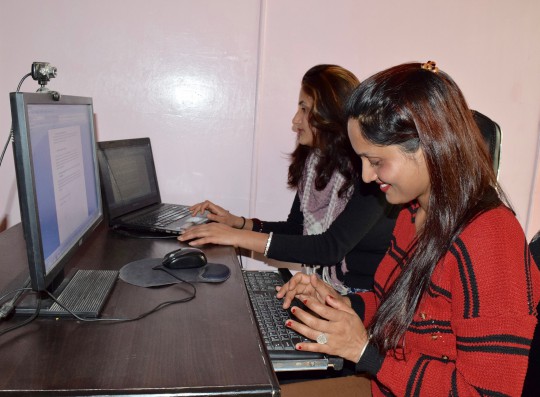Do you want to change the world? You're in the right place! Join us at W4 in empowering girls and women for the benefit of everyone! You can donate to our projects around the world, launch your own team fundraiser, (e-)volunteer your skills and/or spread the word about our work!
How does it work?
Choose one or more projects you care about from our portfolio of projects around the world, make a donation and see the life-changing, even life-saving, impact of your giving!
How does it work?
Create your own uber-cool fundraising team to raise funds for (a) project(s) you care about, then invite your friends/colleagues/family to donate and change the world with you! Multiply the good and multiply your impact!
How do gift cards work?
Offer a friend/colleague/loved one a unique, unforgettable gift with a W4 gift card! When you offer a W4 gift card, the recipient of your gift can choose a project to support from among our many girls' & women's empowerment projects around the world. The recipient of your gift card will receive updates throughout the year about the project, as well as W4 "goodies" relating to the project. So offer a W4 gift card today and spread joy & love!
27695
IT training to help young marginalized Nepalese women gain access to the job market

Testimonial

“Thanks to the IT training course I completed, I found a job with a news agency in Kathmandu. I work as a journalist: I post the news online on the website. I write in Nepali, and I use my IT skills (Word, Photoshop & various software programs). This IT training program has definitely improved my living conditions! Thanks to the IT training I received, I have found a job, so obviously my income has improved. I love working as a journalist and I want to continue doing this job.”
– Sapana Pokhrel, a graduate of the IT Training Program
THE CHALLENGE
Years of internal conflict have had devastating effects on the population of Nepal. More than 10 years after the end of the civil war, 15% of the population is still trapped in extreme poverty and struggling to survive on less than $2.15 a day. In 2015, a 7.8-magnitude earthquake inflicted a new wave of catastrophe upon the impoverished country. Thousands were killed and countless homes and public buildings were damaged or destroyed, undermining Nepal’s development efforts.
Life in Nepal is particularly harsh for poor women and girls, especially in remote rural areas and in the mountains. Gender inequalities remain stark, and violence against girls and women is widespread. Whereas the birth of a boy is celebrated, girls are often considered by their families to be liabilities. In rural areas, early child marriage is common for young girls because parents want to be rid of the burden of caring for their daughters and are often unaware of the dangers of early marriage. Many poor girls and women struggle to gain access to education, 63% of women are literate compared to 81% of males, and the job market. They face insecurity and vulnerability, remaining trapped in poverty and deprived of any opportunities to fulfil their potential.
Meanwhile, the nascent ICT (information & communication technologies) industry in Nepal is growing, offering the country a great deal of potential and a growing source of employment.
IT skills can boost young women’s employability, enabling them to obtain safe, decent work in the burgeoning sector. Access to ICTs can accelerate girls’ and women’s empowerment, giving girls and women access to vital resources, information, and networks.
The good news is that women are slowly becoming an important part of Nepal’s ICT sector, forming groups and organizations to support one another and to raise awareness about the need for more women in the ICT sector. However, for countless girls and young women from poor communities, access to ICTs and IT education remains beyond their financial means and reach.
The SOLUTIONS WE'RE PROPOSING
Together with our field partner RUWON, W4 is working to give young, underprivileged women (women from poor communities) in the Kathmandu area the opportunity to receive quality IT training to increase their employability and facilitate their access to the formal job market.
The program is supporting young women whose families were affected by the 2015 earthquakes. It offers a year-long IT training course, enabling the young women to acquire valuable IT skills that will boost their employability and equip them to access safe jobs.
The program also provides the young women with soft-skills training, boosting their self-confidence, familiarizing them with the employment sector, and giving them job placement support. The goal is to help the young women obtain secure employment and become financially independent.
Financial autonomy is essential in order for young Nepalese women from poor communities to improve their socioeconomic status. It also helps to change mindsets and increase awareness of the value of girls and the importance of investing in girls’ and women’s education.
THE IMPACT OF YOUR GIVING
You can give young Nepalese women from poor families the opportunity to participate in a quality, year-long IT training program. For these young women, this is a truly life-transforming opportunity! It enables the young women to acquire valuable IT knowledge and skills that boost their employability and their chances of obtaining safe, decent employment in the formal sector. Your donation thus helps a woman to obtain secure employment and to lift herself out of poverty. You help launch a virtuous cycle in the life of the young woman, her family, and the entire community!
Poverty statistic: Asian Development Bank
Support us by sharing
and raising awareness!
Contributors
Victor
FranceNasim
FranceLaura
FranceEmily
United StatesRobert
United StatesClaire
FranceGaby
FranceAsso ZONTA Club de Beaune
France
Gita
FranceChloe
FranceLélia
United StatesAnonymous
France
Antonia
Netherlands
andrea
United StatesThank you to WHEELS ON WOMEN and W4's field partners for all that you do to help girls and women to help themselves!

andrea
United StatesThank you to WHEELS ON WOMEN and W4's field partners for all that you do to help girls and women to help themselves!

Gita
France
Antonia
NetherlandsOlympia
United Kingdommarie-christine
France
Gaby
France
Gaby
FranceGreat project!

Gaby
FranceMarie-Christine
FranceSophia
France
Stéphanie
FranceGary
CanadaMathilde
Francejustin
United StatesDonate to this project
ARE YOU SURE YOU WANT TO DELETE?
ARE YOU SURE YOU WANT TO DELETE?
Are you sure ?
Uploading your photo now...
These fields must be completed before you can submit your project :
- Create at least one donation option
- Create at least one donation option (English)
- Create at least one donation option
- Create at least one donation option (English)
Save your draft first
In order to submit your project to our team, you have to save it first
Save your draft first
In order to translate your project, you have to save it first
Submit project translation
To proceed, please tick the ?Translation Available? box on the upper right hand side of your project drafting page.
Submit your translation
You are about to submit your translation. After submission, you will not be able to include further edits to your translation until it has been approved by our team.
Select 1-3 categories relevant to your project :
Digital Inclusion
Disabilities
E-mentoring
Economic empowerment
Education
Emergency Relief
End Child Marriage
Environment
Food Security
Health & HIV/AIDS
Human Rights
Human Trafficking & Exploitation
Microfinance
Role models
Technology
Violence against women


















